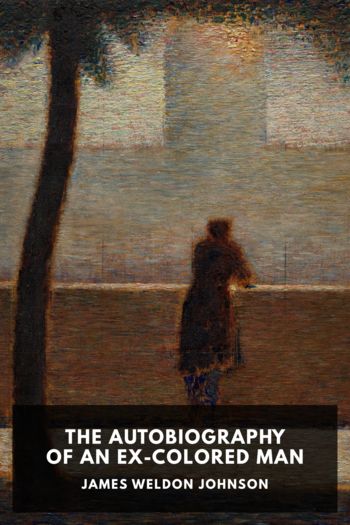The Autobiography of an Ex-Colored Man - James Weldon Johnson (best classic books of all time txt) 📗

- Author: James Weldon Johnson
Book online «The Autobiography of an Ex-Colored Man - James Weldon Johnson (best classic books of all time txt) 📗». Author James Weldon Johnson
I asked him why it was that the proprietor of the house seemed unwilling to accommodate me for more than a couple of days. He informed me that the man ran a lodging house especially for Pullman porters, and as their stays in town were not longer than one or two nights, it would interfere with his arrangements to have anyone stay longer. He went on to say, “You see this room is fixed up to accommodate four men at a time. Well, by keeping a sort of table of trips, in and out, of the men, and working them like checkers, he can accommodate fifteen or sixteen in each week and generally avoid having an empty bed. You happen to catch a bed that would have been empty for a couple of nights.” I asked him where he was going to sleep. He answered, “I sleep in that other cot tonight; tomorrow night I go out.” He went on to tell me that the man who kept the house did not serve meals, and that if I was hungry, we would go out and get something to eat.
We went into the street, and in passing the railroad station I hired a wagon to take my trunk to my lodging place. We passed along until, finally, we turned into a street that stretched away, up and down hill, for a mile or two; and here I caught my first sight of colored people in large numbers. I had seen little squads around the railroad stations on my way south, but here I saw a street crowded with them. They filled the shops and thronged the sidewalks and lined the curb. I asked my companion if all the colored people in Atlanta lived in this street. He said they did not and assured me that the ones I saw were of the lower class. I felt relieved, in spite of the size of the lower class. The unkempt appearance, the shambling, slouching gait, and loud talk and laughter of these people aroused in me a feeling of almost repulsion. Only one thing about them awoke a feeling of interest: that was their dialect. I had read some Negro dialect and had heard snatches of it on my journey down from Washington; but here I heard it in all of its fullness and freedom. I was particularly struck by the way in which it was punctuated by such exclamatory phrases as “Lawd a mussy!” “G’wan, man!” “Bless ma soul!” “Look heah, chile!” These people talked and laughed without restraint. In fact, they talked straight from their lungs and laughed from the pits of their stomachs. And this hearty laughter was often justified by the droll humor of some remark. I paused long enough to hear one man say to another: “Wat’s de mattah wid you an’ yo’ fr’en’ Sam?” and the other came back like a flash: “Ma fr’en’? He ma fr’en’? Man! I’d go to his funeral jes’ de same as I’d go to a minstrel show.” I have since learned that this ability to laugh heartily is, in part, the salvation of the American Negro; it does much to keep him from going the way of the Indian.
The business places of the street along which we were passing consisted chiefly of low bars, cheap dry-goods and notion stores, barber shops, and fish and bread restaurants. We, at length, turned down a pair of stairs that led to a basement and I found myself in an eating-house somewhat better than those I had seen in passing; but that did not mean much for its excellence. The place was smoky, the tables were covered with oilcloth, the floor with sawdust, and from the kitchen came a rancid odor of fish fried over several times, which almost nauseated me. I asked my companion if this was the place where we were to eat. He informed me that it was the best place in town where a colored man could get a meal. I then wanted to know why somebody didn’t open a place where respectable colored people who had money could be accommodated. He answered, “It wouldn’t pay; all the respectable colored people eat at home, and the few who travel generally have friends in the towns to which they go, who entertain them.” He added, “Of course, you could go in any place in the city; they wouldn’t know you from white.”
I sat down with the porter at one of the tables, but was not hungry enough to eat with any relish what was put before me. The food was not badly cooked; but the





Comments (0)